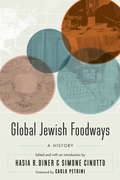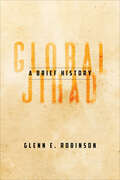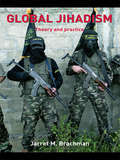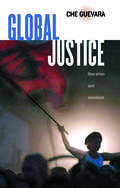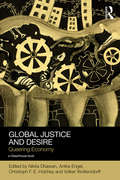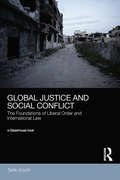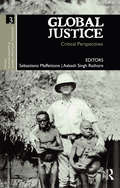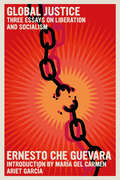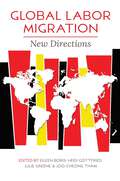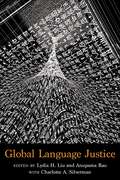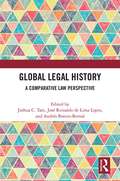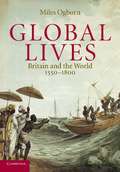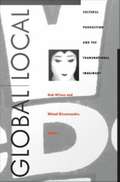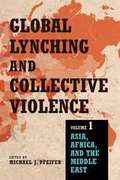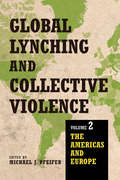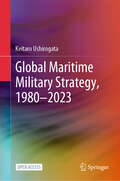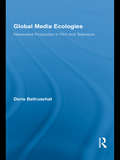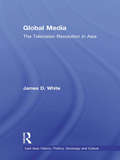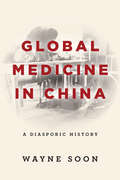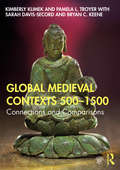- Table View
- List View
Global Issues: Challenges for the 21st Century
by Paula A. Franklin Norman LungerHigh School Social Studies Textbook
Global Issues: Challenges for the 21st Century
by Paula A. Franklin Norman LungerHigh School Social Studies Textbook
Global Japan: The Experience of Japan's New Immigrant and Overseas Communities
by Paul White Roger Goodman Ayumi Takenaka Ceri PeachThe Japanese have long regarded themselves as a homogenous nation, clearly separate from other nations. However, this long-standing view is being undermined by the present international reality of increased global population movement. This has resulted in the establishment both of significant Japanese communities outside Japan, and of large non-Japanese minorities within Japan, and has forced the Japanese to re-conceptualise their nationality in new and more flexible ways.This work provides a comprehensive overview of these issues and examines the context of immigration to and emigration from Japan. It considers the development of important Japanese overseas communities in six major cities worldwide, the experiences of immigrant communities in Japan, as well as assessing the consequences for the Japanese people's view of themselves as a nation.
Global Jewish Foodways: A History (At Table)
by Hasia R. Diner Carlo Petrini Simone CinottoThe history of the Jewish people has been a history of migration. Although Jews invariably brought with them their traditional ideas about food during these migrations, just as invariably they engaged with the foods they encountered in their new environments. Their culinary habits changed as a result of both these migrations and the new political and social realities they encountered. The stories in this volume examine the sometimes bewildering kaleidoscope of food experiences generated by new social contacts, trade, political revolutions, wars, and migrations, both voluntary and compelled. This panoramic history of Jewish food highlights its breadth and depth on a global scale from Renaissance Italy to the post–World War II era in Israel, Argentina, and the United States and critically examines the impact of food on Jewish lives and on the complex set of laws, practices, and procedures that constitutes the Jewish dietary system and regulates what can be eaten, when, how, and with whom. Global Jewish Foodways offers a fresh perspective on how historical changes through migration, settlement, and accommodation transformed Jewish food and customs.
Global Jihad: A Brief History
by Glenn E. RobinsonMost violent jihadi movements in the twentieth century focused on removing corrupt, repressive secular regimes throughout the Muslim world. But following the 1979 Soviet invasion of Afghanistan, a new form of jihadism emerged—global jihad—turning to the international arena as the primary locus of ideology and action. With this book, Glenn E. Robinson develops a compelling and provocative argument about this violent political movement's evolution. Global Jihad tells the story of four distinct jihadi waves, each with its own program for achieving a global end: whether a Jihadi International to liberate Muslim lands from foreign occupation; al-Qa'ida's call to drive the United States out of the Muslim world; ISIS using "jihadi cool" to recruit followers; or leaderless efforts of stochastic terror to "keep the dream alive." Robinson connects the rise of global jihad to other "movements of rage" such as the Nazi Brownshirts, White supremacists, Khmer Rouge, and Boko Haram. Ultimately, he shows that while global jihad has posed a low strategic threat, it has instigated an outsized reaction from the United States and other Western nations.
Global Jihadism: Theory and Practice (Political Violence)
by Jarret M. BrachmanGlobal Jihadism exposes the core doctrine and strategy of today’s global Jihadist movement. The first half of the book explores the ideas upon which groups such as Al Qaeda are built, including the concepts of Jihad, al-Wala wal-Bara, Takfir and Tawhid. Jarret Brachman exposes a genre of Jihadist strategic scholarship that has been virtually ignored in the West and helps to situate it within the broader Salafist religious movement. The second half explores the thinking and activities of Al Qaeda’s propaganda machine, explaining its intricacies and idiosyncrasies. It includes case studies on the rise and fall of global Jihadist terrorism in Saudi Arabia post-9/11, and highlights the explosive results of bringing theory to bear on practice in the United Kingdom over the past twenty years. The book concludes by providing innovative strategies for combating the global Jihadist ideology.
Global Justice
by Ernesto Che Guevara María del Ariet GarcíaIs there an alternative to the neoliberal globalization that is ravaging our planet? Collected here are three classic works by Che Guevara, including his essay, "Socialism and Man in Cuba.""The powerful of the earth should take heed: deep inside that T-shirt where we have tried to trap him, Che's eyes are still burning with impatience." Ariel Dorfman
Global Justice and Desire: Queering Economy (Social Justice)
by Nikita Dhawan Antke Engel Christoph H.E. Holzhey Volker WoltersdorffEmploying feminist, queer, and postcolonial perspectives, Global Justice and Desire addresses economy as a key ingredient in the dynamic interplay between modes of subjectivity, signification and governance. Bringing together a range of international contributors, the book proposes that both analyzing justice through the lens of desire, and considering desire through the lens of justice, are vital for exploring economic processes. A variety of approaches for capturing the complex and dynamic interplay of justice and desire in socioeconomic processes are taken up. But, acknowledging a complexity of forces and relations of power, domination, and violence – sometimes cohering and sometimes contradictory – it is the relationship between hierarchical gender arrangements, relations of exploitation, and their colonial histories that is stressed. Therefore, queer, feminist, and postcolonial perspectives intersect as Global Justice and Desire explores their capacity to contribute to more just, and more desirable, economies.
Global Justice and Social Conflict: The Foundations of Liberal Order and International Law
by Tarik KochiGlobal Justice and Social Conflict offers a ground-breaking historical and theoretical reappraisal of the ideas that underpin and sustain the global liberal order, international law and neoliberal rationality. Across the 20th and 21st centuries, liberalism, and increasingly neoliberalism, have dominated the construction and shape of the global political order, the global economy and international law. For some, this development has been directed by a vision of ‘global justice’. Yet, for many, the world has been marked by a history and continued experience of injustice, inequality, indignity, insecurity, poverty and war – a reality in which attempts to realise an idea of justice cannot be detached from acts of violence and widespread social conflict. In this book Tarik Kochi argues that to think seriously about global justice we need to understand how both liberalism and neoliberalism have pushed aside rival ideas of social and economic justice in the name of private property, individualistic rights, state security and capitalist ‘free’ markets. Ranging from ancient concepts of natural law and republican constitutionalism, to early modern ideas of natural rights and political economy, and to contemporary discourses of human rights, humanitarian war and global constitutionalism, Kochi shows how the key foundational elements of a now globalised political, economic and juridical tradition are constituted and continually beset by struggles over what counts as justice and over how to realise it. Engaging with a wide range of thinkers and reaching provocatively across a breadth of subject areas, Kochi investigates the roots of many globalised struggles over justice, human rights, democracy and equality, and offers an alternative constitutional understanding of the future of emancipatory politics and international law. Global Justice and Social Conflict will be essential reading for scholars and students with an interest in international law, international relations, international political economy, intellectual history, and critical and political theory.
Global Justice, State Duties
by Malcolm Langford Wouter Vandenhole Martin Scheinin Willem van Genugten Malcolm Langford Wouter Vandenhole Martin Scheinin Willem Van GenugtenThe rise of globalization and the persistence of global poverty are straining the territorial paradigm of human rights. This book asks if states possess extraterritorial obligations under existing international human rights law to respect and ensure economic, social, and cultural rights and how far those duties extend. Taking a departure point in theory and practice, the book is the first of its kind to analyze the principal cross-cutting legal issues at stake: the legal status of obligations, jurisdiction, causation, division of responsibility, and remedies and accountability. The book focuses specifically on the role of states but also addresses their duties to regulate powerful nonstate actors. The authors demonstrate that many key issues have been resolved or clarified in international law while others remain controversial or await the development of further practice, particularly the scope of jurisdiction and the quantitative dimension of extraterritorial obligations to fulfill.
Global Justice: Critical Perspectives (Ethics, Human Rights and Global Political Thought)
by Sebastiano Maffettone; Aakash Singh RathoreThe global justice debate has been raging for forty years. Not merely the terms and conditions, but, more deeply, the epistemic, existential and ethical grounds of the international relations of persons, states and institutions are being determined, debated and negotiated. Yet the debate remains essentially a parochial one, confined largely to Western intellectuals and institutional spaces. An Introduction to the field is therefore still urgently required, because it remains necessary to include more ‘global’ voices into this debate of worldwide reach and significance. The book addresses this need in two closely related ways. In Part I, it introduces the main contours of the debate by reproducing three of the most fundamental and influential essays that have been composed on the topic — essays by Peter Singer, Thomas Pogge and Thomas Nagel. In Part II, it makes a decisive critical intervention in the main stream of the debate through exposing the participation deficit afflicting the theorization of global justice. This part begins with a well-known essay by Amartya Sen, who famously referred to the ‘parochialism’ of the global justice debate in making a break with the Rawlsian paradigm that has dominated the field until now. Finally, a series of lively essays newly composed for this volume reflect on the possibilities for deparochializing global justice opened up by Sen’s work in this area. The book will be useful for students of international relations, postcolonial studies, political theory, and social and political philosophy, as well as for those engaged in studies of globalization or global studies.
Global Justice: Three Essays on Liberation and Socialism (The Che Guevara Library)
by Ernesto Che GuevaraThree speeches on corporate globalism and imperialism by one of the most widely known guerilla fighters, political theorists, and organizers, Che Guevara.In this collection of three speeches, Ernesto Che Guevara offers a revolutionary view of a world in which human solidarity and understanding replace imperialist aggression and exploitation. First, in a sharp speech given in Algeria on February 24, 1965 at the Afro-Asia Economic Seminar, Che speaks about the nature of capitalism and the revolutionary struggle that would open the way for a new, socialist society. Guevara's 1965 essay, "Socialism and Man in Cuba," is a milestone in twentieth-century emancipatory social thought. Finally, &“Message to the Tricontinental&” is one of Che&’s more well-known works, which outlines the tactics and strategies that should be followed in revolutionary struggle. This collection of writings merges Che's philosophy, politics, and economics in his all encompassing, coherent revolutionary vision. His ideas and his struggle strike a chord in the current search for global justice.
Global Labor Migration: New Directions (Studies of World Migrations)
by Eileen Boris Bridget Anderson Pun Ngai Julie Greene Heidi Gottfried Judy Fudge Jenny Chan Rutvica Andrijasevic Radhika Natarajan Matt Withers Joo-Cheong Tham Nicola Piper Helen Sampson Katie Bales Penelope Ciancanelli Felipe Barradas Bastos Charlie Fanning Jorge L Giovannetti-Torres Justin Jackson Bastiaan Nugteren Jessica R Pliley Devi Sacchetto Yael SchacherAround the world, hundreds of millions of labor migrants endure exploitation, lack of basic rights, and institutionalized discrimination and marginalization. What dynamics and drivers have created a world in which such a huge--and rapidly growing--group toils as marginalized men and women, existing as a lower caste institutionally and juridically? In what ways did labor migrants shape their living and working conditions in the past, and what opportunities exist for them today? Global Labor Migration presents new multidisciplinary, transregional perspectives on issues surrounding global labor migration. The essays go beyond disciplinary boundaries, with sociologists, ethnographers, legal scholars, and historians contributing research that extends comparison among and within world regions. Looking at migrant workers from the late nineteenth century to the present day, the contributors illustrate the need for broader perspectives that study labor migration over longer timeframes and from wider geographic areas. The result is a unique, much-needed collection that delves into one of the world’s most pressing issues, generates scholarly dialogue, and proposes cutting-edge research agendas and methods. Contributors: Bridget Anderson, Rutvica Andrijasevic, Katie Bales, Jenny Chan, Penelope Ciancanelli, Felipe Barradas Correia Castro Bastos, Eileen Boris, Charlie Fanning, Judy Fudge, Jorge L. Giovannetti-Torres, Heidi Gottfried, Julie Greene, Justin Jackson, Radhika Natarajan, Pun Ngai, Bastiaan Nugteren, Nicola Piper, Jessica R. Pliley, Devi Sacchetto, Helen Sampson, Yael Schacher, Joo-Cheong Tham, and Matt Withers
Global Language Justice
by Liu, Lydia H.; Rao, AnupamaMore than 40 percent of the world’s estimated 7,100+ languages are in danger of disappearing by the end of this century. As with the decline of biodiversity, language loss has been attributed to environmental degradation, developmentalism, and the destruction of Indigenous communities. This book brings together leading experts and younger scholars across the humanities and social sciences to investigate what global language justice looks like in a time of climate crisis. Examining the worldwide loss of linguistic diversity, they develop a new conception of justice to safeguard marginalized languages.Global Language Justice explores the socioeconomic transformations that both accelerate the decline of minoritized languages and give rise to new possibilities through population movement, unexpected encounters, and technological change. It also critically examines the concepts that are typically deployed to defend linguistic diversity, including human rights, inclusiveness, and equality. Contributors take up topics such as mapping language communities in New York City or how Indigenous innovation challenges notions of linguistic purity. They demonstrate the need to reckon with linguistic diversity in order to achieve a sustainable global economic system and show how the concept of digital vitality can push language justice in new directions. Interspersed with their essays are multilingual works by world-renowned poets and artists that engage with and deepen the book’s themes. Integrating ambitious theoretical exploration with concrete solutions, Global Language Justice offers vital new perspectives on the place of linguistic diversity in ongoing ecological crises.
Global Legal History: A Comparative Law Perspective
by Joshua C. Tate José Reinaldo de Lima Lopes Andrés Botero-BernalThis collection brings together a group of international legal historians to further scholarship in different areas of comparative and regional legal history. Authors are drawn from Europe, Asia, and the Americas to produce new insights into the relationship between law and society across time and space. The book is divided into three parts: legal history and legal culture across borders, constitutional experiences in global perspective, and the history of judicial experiences. The three themes, and the chapters corresponding to each, provide a balance between public law and private law topics, and reflect a variety of methodologies, both empirical and theoretical. The volume highlights the gains that may be made by comparing the development of law in different countries and different time periods. The book will be of interest to an international readership in Legal History, Comparative Law, Law and Society, and History.
Global Lives: Britain and the World, 1550-1800
by Miles OgbornThis is a fascinating and unique account of Britain's rise as a global imperial power told through the lives of over forty individuals from a huge range of backgrounds. Miles Ogborn relates and connects the stories of monarchs and merchants, planters and pirates, slaves and sailors, captives and captains, reactionaries and revolutionaries, artists and abolitionists from all corners of the globe. These dramatic stories give new life to the exploration of the history and geography of changing global relationships, including settlement in North America, the East India Company's trade and empire, transatlantic trade, the slave trade, the rise and fall of piracy, and scientific voyaging in the Pacific. Through these many biographies, including those of Anne Bonny, Captain Cook, Queen Elizabeth I, Pocahontas, and Walter Ralegh, early modern globalisation is presented as something through which different people lived in dramatically contrasting ways, but in which everyone played a part.
Global Local: Cultural Production and the Transnational Imaginary
by Wimal Dissanayake Rob WilsonThis groundbreaking collection focuses on what may be, for cultural studies, the most intriguing aspect of contemporary globalization--the ways in which the postnational restructuring of the world in an era of transnational capitalism has altered how we must think about cultural production. Mapping a "new world space" that is simultaneously more globalized and localized than before, these essays examine the dynamic between the movement of capital, images, and technologies without regard to national borders and the tendency toward fragmentation of the world into increasingly contentious enclaves of difference, ethnicity, and resistance. Ranging across issues involving film, literature, and theory, as well as history, politics, economics, sociology, and anthropology, these deeply interdisciplinary essays explore the interwoven forces of globalism and localism in a variety of cultural settings, with a particular emphasis on the Asia-Pacific region. Powerful readings of the new image culture, transnational film genre, and the politics of spectacle are offered as is a critique of globalization as the latest guise of colonization. Articles that unravel the complex links between the global and local in terms of the unfolding narrative of capital are joined by work that illuminates phenomena as diverse as "yellow cab" interracial sex in Japan, machinic desire in Robocop movies, and the Pacific Rim city. An interview with Fredric Jameson by Paik Nak-Chung on globalization and Pacific Rim responses is also featured, as is a critical afterword by Paul Bov. Positioned at the crossroads of an altered global terrain, this volume, the first of its kind, analyzes the evolving transnational imaginary--the full scope of contemporary cultural production by which national identities of political allegiance and economic regulation are being undone, and in which imagined communities are being reshaped at both the global and local levels of everyday existence.
Global Lynching and Collective Violence: Asia, Africa, and the Middle East
by Michael J. PfeiferOften considered peculiarly American, lynching in fact takes place around the world. In the first book of a two-volume study, Michael J. Pfeifer collects essays that look at lynching and related forms of collective violence in Africa, Asia, and the Middle East. Understanding lynching as a transnational phenomenon rooted in political and cultural flux, the writers probe important issues from Indonesia--where a long history of public violence now twines with the Internet--to South Africa, with its notorious history of necklacing. Other scholars examine lynching in medieval Nepal, the epidemic of summary executions in late Qing-era China, the merging of state-sponsored and local collective violence during the Nanking Massacre, and the ways public anger and lynching in India relate to identity, autonomy, and territory. Contributors: Laurens Bakker, Shaiel Ben-Ephraim, Nandana Dutta, Weiting Guo, Or Honig, Frank Jacob, Michael J. Pfeifer, Yogesh Raj, and Nicholas Rush Smith.
Global Lynching and Collective Violence: The Americas and Europe
by Michael J. PfeiferIn this second volume of the groundbreaking survey, Michael J. Pfeifer edits a collection of essays that illuminates lynching and other extrajudicial "rough justice" as a transnational phenomenon responding to cultural and legal issues. The volume's European-themed topics explore why three communities of medieval people turned to mob violence, and the ways exclusion from formal institutions fueled peasant rough justice in Russia. Essays on Latin America examine how lynching in the United States influenced Brazilian debates on race and informal justice, and how shifts in religious and political power drove lynching in twentieth century Mexico. Finally, scholars delve into English Canadians' use of racist and mob violence to craft identity; the Communist Party's Depression-era campaign against lynching in the United States; and the transnational links that helped form--and later emanated from--Wisconsin's notoriously violent skinhead movement in the late twentieth century. Contributors: Brent M. S. Campney, Amy Chazkel, Stephen P. Frank, Dean J. Kotlowski, Michael J. Pfeifer, Gema SantamarÃa, Ryan Shaffer, and Hannah Skoda.
Global Maritime Military Strategy, 1980–2023
by Keitaro UshirogataThis open access book is an ambitious study about how to use comparative methods to analyze contemporary military strategy in the maritime domain. Based on the three strategic concepts of area denial, sea control and power projection, this book analyzes the intensive conventional capabilities of six major powers’ military strategies. These include the United States, the United Kingdom and Japan, the so-called ‘sea powers,’ and Russia, China and India, which are usually recognized as ‘land-powers.’Through the analysis, this book aims to accomplish the following three main objectives: 1. To reconsider the basic concepts of maritime military strategic studies, which have not changed for almost one hundred years, and to propose a new analytical framework based on the following three elements—as well as verifying the appropriateness of this framework. a. The capability with which a country can deny military threat against its territory through the maritime domain within the geographic theater, i.e., roughly one thousand to two thousand kilometers from its coastline (area denial). b. The capability with which a country can obtain military superiority or disrupt an adversary’s military superiority in the open ocean (sea control). c. The capability with which a country can project military power from the maritime domain to other countries’ territories, accomplishing military strategic objectives (power projection). 2. To verify the six major powers’ long-term military strategic objectives, for example, whether the country aims to enhance its power in the maritime domain, or to project its military power to the other countries/areas beyond the maritime domain; to do this by analyzing each country’s force building directions. In addition, this book assesses each country’s capability for high-intensive conflict and unravels each security/military strategic objectives.3. By examining the strategic objectives of major powers, this book may contribute to establishing Japan’s future defense strategy.
Global Market Conditions and Systemic Risk
by Brenda González-Hermosillo Heiko HesseA report from the International Monetary Fund.
Global Media Ecologies: Networked Production in Film and Television (Routledge Advances In Internationalizing Media Studies #6)
by Doris BaltruschatIn this study, Baltruschat calls attention to dramatic changes in worldwide media production. Her work provides new insights into industry re-organization, digital media, and audience interactivity as pivotal relationships are redrawn along the entire value chain of production, distribution, and consumption. Based on an international study, she details how cultural agents now negotiate a media landscape through collaborative ventures, co-productions and format franchising. These varied collaborations define the new global media economy and affect a shift across the entire field of cultural production. Through detailing the intricacies of globally networked production ecologies, Baltruschat elucidates the shifting power relations in media production, especially in regards to creative labor and trade of intellectual properties. In the new global economy, "content" has become the "new currency." As a result, relational dynamics between cultural agents emerge as key forces in shaping worldwide cultural production, now increasingly characterized by flexible production and consumption. The blurring of lines in international media developments require new parameters, which define creativity and intellectual property in relation to interactive audiences and collaboratively produced content. Baltruschat clearly maps and defines these new dynamics and provides solutions as to how creative labor constellations can advance and enrich the new media economy. This is especially pertinent as global film and TV production does not necessarily result in greater media diversity. On the contrary, interdependencies in policy regimes, prioritization of certain genres, and branded entertainment epitomize how current networked ecologies reflect broader trends in cultural and economic globalization.
Global Media: The Television Revolution in Asia (East Asia: History, Politics, Sociology and Culture)
by James D. WhiteThis book is about the processes of globalization, demonstrated through a comparative study of three television case histories in Asia. Also illustrated are different approaches to providing television services in the world: public service (NHK in Japan), state (CCTV in China) and commercial (STAR TV, based in Hong Kong). Through its focus, Global Media addresses a considerable lacuna in the media studies literature, which tends to have a heavy Western bias. It provides an original addition to the literature on globalization, which is often abstract and anecdotal, in addition to making a major contribution to comparative research in Asia. Finally, it offers a thoughtful causal layered analysis, with a concluding argument in favor of public service television.
Global Medicine in China: A Diasporic History
by Wayne SoonIn 1938, one year into the Second Sino-Japanese War, the Chinese military found itself in dire medical straits. Soldiers were suffering from deadly illnesses, and were unable to receive blood transfusions for their wounds. The urgent need for medical assistance prompted an unprecedented flowering of scientific knowledge in China and Taiwan throughout the twentieth century. Wayne Soon draws on archives from three continents to argue that Overseas Chinese were key to this development, utilizing their global connections and diasporic links to procure much-needed money, supplies, and medical expertise. The remarkable expansion of care and education that they spurred saved more than four million lives and trained more than fifteen thousand medical personnel. Moreover, the introduction of military medicine shifted biomedicine out of elite, urban civilian institutions and laboratories and transformed it into an adaptive field-based practice for all. Universal care, practical medical education, and mobile medicine are all lasting legacies of this effort.
Global Medieval Contexts 500 – 1500: Connections and Comparisons
by Sarah Davis-Secord Kimberly Klimek Pamela L. Troyer Bryan C. KeeneGlobal Medieval Contexts 500–1500: Connections and Comparisons provides a unique wide-lens introduction to world history during this period. Designed for students new to the subject, this textbook explores vital networks and relationships among geographies and cultures that shaped medieval societies. The expert author team aims to advance a global view of the period and introduce the reader to histories and narratives beyond an exclusively European context. Key Features: Divided into chronological sections, chapters are organized by four key themes: Religion, Economics, Politics, and Society. This framework enables students to connect wider ideas and debates across 500 to 1500. Individual chapters address current theoretical discussions, including issues around gender, migration, and sustainable environments. The authors’ combined teaching experience and subject specialties ensure an engaging and accessible overview for students of history, literature, and those undertaking general studies courses. Theory boxes and end-of-chapter questions provide a basis for group discussion and research. Full-color maps and images illustrate chapter content and support understanding. As a result, this text is essential reading for all those interested in learning more about the histories and cultures of the period, as well as their relevance to our own contemporary experiences and perspectives. This textbook is supported by a companion website providing core resources for students and lecturers.


